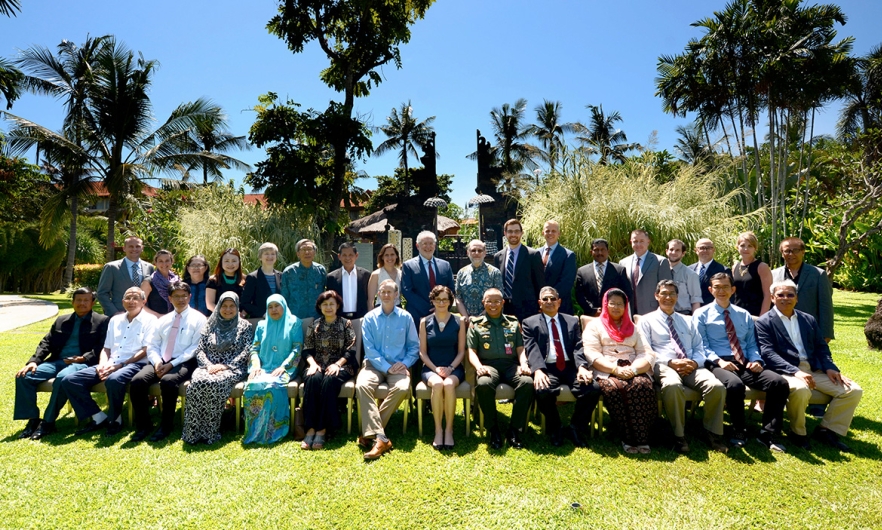Multilateral dialogue participants discuss collaborative approach to biosecurity threats in Southeast Asia
Center News

August 23, 2018 – Biosecurity risks to Southeast Asia stem from the region’s highly dynamic human-animal-environmental interface, a growing threat from terrorist groups, and the increased prevalence of advanced biotechnology. Sustainable mitigation of those risks requires cross-sector and cross-governmental collaboration as threats continue to evolve.
That was the prevailing theme of discussions among Southeast Asian and US participants at the latest multilateral biosecurity dialogue meeting, hosted by the Johns Hopkins Center for Health Security in Nusa Dua, Indonesia, in April 2018. Now in its fifth year, the dialogue brings together diverse experts and officials from Singapore, Malaysia, Indonesia, and the United States, along with observers from the Philippines and Thailand, to promote engagement that helps improve national and regional response to natural, accidental, and deliberate biological events.
The dialogue provides a mechanism to inform national leaders about biosecurity threats facing the Southeast Asia region—threats that are also of concern to the United States.
“Participants routinely brief senior government officials about lessons drawn from dialogue meetings,” the Center’s project team noted in its meeting report. “Their efforts raise awareness among elected and appointed officials about the reality of biosecurity threats and the importance of further investment in and support for national preparedness programs.”
Center project team members are Director Tom Inglesby, MD; Deputy Director Anita Cicero, JD; and Senior Analysts Matthew Shearer, MPH, and Diane Meyer, MPH. At this meeting, the dialogue group shared ideas on the following key topics:
- National biosecurity priorities and challenges
- Biosurveillance, detection, and public health epidemic response
- Biosafety, biosecurity, and misuse of biotechnology
- Medical countermeasures research and development
- One Health and biosecurity
- Impact of geopolitical issues, intergovernmental organizations, and regional developments on biosecurity
- Medical care during public health emergencies
- Public communication about advances in life sciences and biosecurity threats
- Countries’ participation in the Biological and Toxin Weapons Convention
Details on these discussion topics are available in the summary meeting report.
This “Track II” dialogue originated in 2014 as a bilateral effort, facilitated by the Center, between Singapore and the United States and expanded to include Malaysia and Indonesia in 2015. The Center facilitates a separate Track II biosecurity dialogue between India and the United States. Track II dialogues are an opportunity for respected, experienced stakeholders inside and outside of government to collectively identify important issues that merit official policy engagement between and among governments. With this foundation, participants are prepared to engage senior leadership in their home countries in an influential way.
Prior to the 2017 dialogue meeting in Washington, DC, Malaysian and Indonesian participants briefed their ministers of health and defense, and Singaporean participants began providing regular updates on the dialogue at the permanent secretary level. Relationships formed in this dialogue also inspired participants from Malaysia, the Philippines, and Singapore to start a program to raise awareness about regional biosecurity threats, hoping to establish the event as an annual series.
Funding and support for the dialogue was provided through the Project on Advanced Systems and Concepts for Countering WMD at the United States Air Force Academy and the US Defense Threat Reduction Agency.
About the Johns Hopkins Center for Health Security:
The Johns Hopkins Center for Health Security works to protect people from epidemics and disasters and build resilient communities through innovative scholarship, engagement, and research that strengthens the organizations, systems, policies, and programs essential to preventing and responding to public health crises. The Center is part of the Johns Hopkins Bloomberg School of Public Health and is located in Baltimore, MD.
